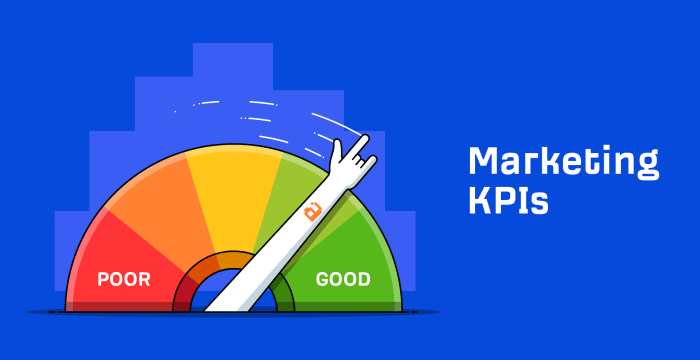Tracking Marketing KPIs is the key to unlocking business potential and making informed decisions. Get ready to dive into the world of marketing metrics and strategies with a fresh perspective that will keep you on the edge of your seat.
From understanding the importance of KPIs to visualizing data for impactful presentations, this topic covers it all in a way that’s engaging and easy to grasp.
Importance of Tracking Marketing KPIs
Tracking marketing KPIs is essential for businesses to measure the effectiveness of their marketing strategies and campaigns. By monitoring key performance indicators, companies can gain valuable insights into their marketing efforts, identify areas for improvement, and make data-driven decisions to optimize their marketing ROI.
Examples of Key Performance Indicators
- Conversion Rate: The percentage of website visitors who take a desired action, such as making a purchase or signing up for a newsletter.
- Customer Acquisition Cost (CAC): The total cost incurred to acquire a new customer, including marketing and sales expenses.
- Return on Investment (ROI): The ratio of net profit to the cost of the marketing campaign, indicating the efficiency of the marketing spend.
- Click-Through Rate (CTR): The percentage of people who click on a link in an email, ad, or webpage, measuring the engagement level of the audience.
Impact of Tracking KPIs on Decision-Making Processes
Tracking marketing KPIs provides companies with valuable data that can influence their decision-making processes. By analyzing KPIs, businesses can identify which marketing channels are most effective, allocate resources efficiently, and adjust their strategies to meet their goals. This data-driven approach helps companies make informed decisions that lead to improved marketing performance and overall business success.
Setting SMART Marketing KPIs
In order to effectively track and measure the success of your marketing efforts, it’s crucial to set SMART Marketing KPIs. SMART stands for Specific, Measurable, Achievable, Relevant, and Time-bound.Aligning KPIs with your business objectives is significant because it ensures that your marketing efforts are directly contributing to the overall goals of the company. By setting SMART Marketing KPIs that are in line with your business objectives, you can track progress and make data-driven decisions to improve performance.
Step-by-step Guide to Setting SMART Marketing KPIs
- Specific: Clearly define the objective you want to achieve with your marketing efforts. Make sure it is detailed and leaves no room for ambiguity.
- Measurable: Establish concrete metrics to measure the success of your marketing campaigns. This could include metrics such as website traffic, conversion rates, or social media engagement.
- Achievable: Set goals that are realistic and attainable based on your resources and capabilities. Avoid setting KPIs that are too lofty and unattainable.
- Relevant: Ensure that your KPIs are directly related to your marketing objectives and overall business goals. They should have a clear impact on the success of your marketing efforts.
- Time-bound: Set a specific timeframe for achieving your KPIs. This helps create a sense of urgency and accountability, driving you to work towards your goals within a defined time frame.
Tools for Tracking Marketing KPIs

Tracking marketing KPIs is essential for measuring the success of marketing campaigns and strategies. There are various tools available in the market to help businesses effectively track and analyze their marketing performance.
Popular Tools for Tracking Marketing KPIs
- Google Analytics: A widely used tool for tracking website traffic, conversions, and other key metrics.
- HubSpot: Offers a comprehensive platform for tracking KPIs across various marketing channels and campaigns.
- Buffer: Helps in tracking social media engagement, reach, and other social media KPIs.
Comparison of KPI Tracking Tools
- Google Analytics: Provides detailed insights into website performance and user behavior, but may be overwhelming for beginners.
- HubSpot: Offers a user-friendly interface and integrates various marketing tools, but can be expensive for small businesses.
- Buffer: Focuses on social media tracking and scheduling, but may lack the depth of analytics compared to other tools.
Manual Tracking vs. Automated Tracking Tools
Manual tracking involves recording and analyzing data by hand, which can be time-consuming and prone to errors. On the other hand, automated tracking tools streamline the process, provide real-time data, and offer more accurate insights. However, automated tools may require a learning curve and initial setup costs.
Data Visualization for Marketing KPIs

Data visualization plays a crucial role in presenting marketing KPIs effectively. By transforming complex data into visual representations, businesses can easily communicate insights to stakeholders, identify trends, and make informed decisions based on the data.
Importance of Data Visualization
- Visualizations make it easier to interpret data quickly and identify patterns or anomalies.
- Charts, graphs, and dashboards help in presenting KPI data in a visually appealing and easy-to-understand format.
- Visual representations allow stakeholders to grasp the key metrics at a glance, saving time and improving decision-making processes.
Effective Data Visualization Techniques
- Use line charts to track trends over time for KPIs such as website traffic or sales performance.
- Create pie charts to show the distribution of different marketing channels in a campaign’s performance.
- Utilize heat maps to highlight areas of high and low performance in a visual format.
Communicating Insights to Stakeholders
- Visual representations of KPIs help in presenting data in a more engaging and understandable manner to stakeholders.
- By using graphs and charts, businesses can illustrate progress towards goals and showcase areas that need improvement.
- Sharing visually appealing dashboards with stakeholders can facilitate discussions and align everyone on the same page regarding marketing performance.